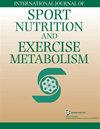英国陆军军官学员训练中的营养和体力活动第2部分:能量和常量营养素摄入的每日分布。
IF 3
3区 医学
Q2 NUTRITION & DIETETICS
International journal of sport nutrition and exercise metabolism
Pub Date : 2022-03-16
DOI:10.1123/ijsnem.2021-0191
引用次数: 4
摘要
饮食摄入和身体活动影响训练期间的表现和适应。本研究的目的是比较英国陆军军官学员训练期间的能量和宏量营养素摄入量与膳食指南,并描述每日能量和宏量营养素摄入量的分布和估计的能量消耗。13名参与者(7名女性)在三个独立的军事训练期间接受监测,其中9天是在营地进行的,5天是在野外进行的,9天是两者混合进行的。饮食摄入量是通过研究人员主导的食物称重和食物日记来测量的,能量消耗是通过腕带加速度计来估计的。在营地训练(男性= -16%,女性= -9%)、野外训练(男性= -33%,女性= -42%)以及营地和野外联合训练(男性和女性均为-34%)期间,男性(4,600千卡/天)和女性(3,500千卡/天)的能量摄入低于指导值。在野外训练(男性= -18%,女性= -37%)和营地和野外联合训练(男性= -33%,女性= -39%)期间,男性和女性的碳水化合物摄入量分别低于指导值(6 g·kg-1·day-1)。在营地训练期间,男性和女性的蛋白质摄入量均高于指导值(1.2 kcal·kg-1·day-1)(男性= 48%,女性= 39%),而在野外训练期间,仅女性的蛋白质摄入量低于指导值(-27%)。营地训练期间的能量和常量营养素摄入以吃饭时间为中心,能量消耗有明显的睡眠/觉醒周期。野外运动期间,能量和常量营养素的摄入是个体可变的,白天和晚上的能量消耗都很高。这些发现可用于为基于证据的干预措施提供信息,以改变体力活动前后能量和宏量营养素摄入的数量和时间,以优化军事训练期间的表现和适应。本文章由计算机程序翻译,如有差异,请以英文原文为准。
Nutrition and Physical Activity in British Army Officer Cadet Training Part 2-Daily Distribution of Energy and Macronutrient Intake.
Dietary intake and physical activity impact performance and adaptation during training. The aims of this study were to compare energy and macronutrient intake during British Army Officer Cadet training with dietary guidelines and describe daily distribution of energy and macronutrient intake and estimated energy expenditure. Thirteen participants (seven women) were monitored during three discrete periods of military training for 9 days on-camp, 5 days of field exercise, and 9 days of a mixture of the two. Dietary intake was measured using researcher-led food weighing and food diaries, and energy expenditure was estimated from wrist-worn accelerometers. Energy intake was below guidelines for men (4,600 kcal/day) and women (3,500 kcal/day) during on-camp training (men = -16% and women = -9%), field exercise (men = -33% and women = -42%), and combined camp and field training (men and women both -34%). Carbohydrate intake of men and women were below guidelines (6 g·kg-1·day-1) during field exercise (men = -18% and women = -37%) and combined camp and field training (men = -33% and women = -39%), respectively. Protein intake was above guidelines (1.2 kcal·kg-1·day-1) for men and women during on-camp training (men = 48% and women = 39%) and was below guidelines during field exercise for women only (-27%). Energy and macronutrient intake during on-camp training centered around mealtimes with a discernible sleep/wake cycle for energy expenditure. During field exercise, energy and macronutrient intake were individually variable, and energy expenditure was high throughout the day and night. These findings could be used to inform evidenced-based interventions to change the amount and timing of energy and macronutrient intake around physical activity to optimize performance and adaptations during military training.
求助全文
通过发布文献求助,成功后即可免费获取论文全文。
去求助
来源期刊
CiteScore
5.00
自引率
8.00%
发文量
50
审稿时长
6-12 weeks
期刊介绍:
The International Journal of Sport Nutrition and Exercise Metabolism (IJSNEM) publishes original scientific investigations and scholarly reviews offering new insights into sport nutrition and exercise metabolism, as well as articles focusing on the application of the principles of biochemistry, physiology, and nutrition to sport and exercise. The journal also offers editorials, digests of related articles from other fields, research notes, and reviews of books, videos, and other media releases.
To subscribe to either the print or e-version of IJSNEM, press the Subscribe or Renew button at the top of your screen.

 求助内容:
求助内容: 应助结果提醒方式:
应助结果提醒方式:


